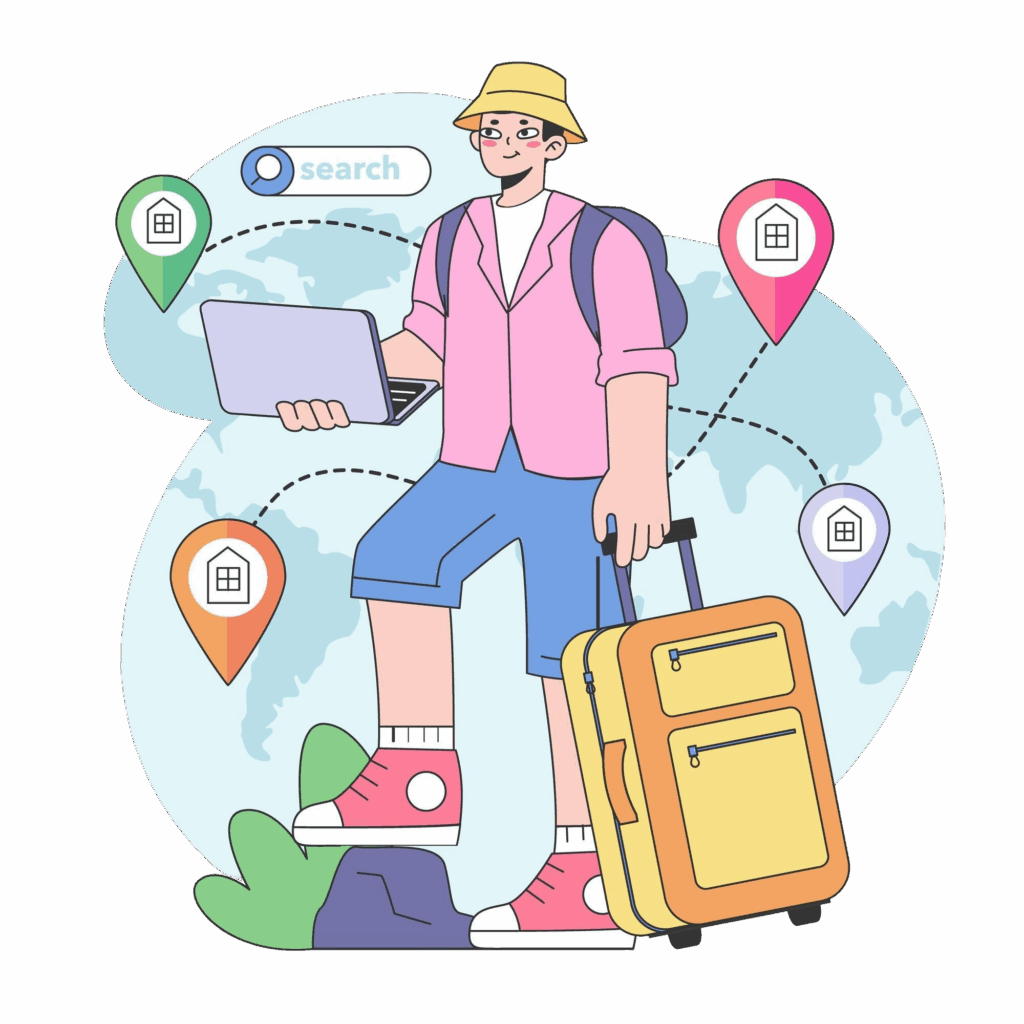Launching an online travel agency in today’s competitive market requires strategic planning, substantial investment, and the right technology foundation. With the global OTA market projected to reach $1,134 billion by 2027, there’s significant opportunity for new entrants who understand the essential steps to build a successful travel booking platform.
Success Reality Check: 73% of online travel agency startups fail within their first 3 years due to inadequate planning, insufficient capital, or poor technology choices. Following a structured approach significantly improves your chances of building a profitable OTA business.
Step 1: Conduct Comprehensive Market Research and Define Your Niche
Success in the online travel agency business starts with thorough market research and identifying a specific niche where you can compete effectively against established players.
Market Research Framework
- Target Market Analysis: Demographics, travel preferences, booking behavior
- Competitive Analysis: Direct/indirect competitors, pricing strategies, technology gaps
- Niche Identification: Underserved markets, specialization opportunities
- Profitable Niches: Sustainable travel, remote work travel, cultural immersion
Step 2: Develop a Comprehensive Business Plan
A detailed business plan serves as your roadmap for launching and scaling your online travel agency. This document guides decision-making, attracts investors, and helps track progress against defined goals.
Financial Planning Essentials
Startup Costs
- Technology Development: $300,000-800,000
- Legal and Licensing: $25,000-75,000
- Initial Marketing: $100,000-300,000
- Working Capital: $200,000-500,000
Monthly Operating Costs
- Staff Salaries: $50,000-150,000
- Marketing: $75,000-200,000
- Technology: $15,000-40,000
- Operations: $18,000-45,000
Step 3: Secure Funding and Investment
Launching an online travel agency requires significant capital investment. Understanding your funding options and preparing compelling investor presentations is essential.
Funding Options
- Bootstrap: $100,000-500,000 (Full control, limited scale)
- Angel Investment: $250,000-2,000,000 (Industry expertise, equity dilution)
- Venture Capital: $1,000,000+ (Large scale, significant pressure)
Step 4: Choose Your Technology Platform and Architecture
Technology choices fundamentally impact your online travel agency’s success. Selecting the right platform and architecture is crucial for scalability and competitiveness.
Build vs Buy Decision
| Approach |
Timeline |
Cost |
Risk |
| Custom Development |
18-36 months |
$800K-$3M |
High |
| Ready Platform |
3-6 months |
$100K-$500K |
Lower |
Step 5: Obtain Necessary Licenses and Legal Compliance
Operating an online travel agency requires various licenses, permits, and legal compliance measures. Requirements vary by jurisdiction and business model.
Legal Requirements
- Business Registration: LLC/Corporation, tax IDs, business license
- Travel Licenses: Travel agent license, tour operator permits
- Insurance: Professional liability, cyber liability, surety bonds
- Data Protection: GDPR, CCPA, PCI DSS compliance
Step 6: Establish Supplier Relationships and Inventory Access
Success depends on accessing competitive inventory from hotels, airlines, and other travel suppliers. Building strong supplier relationships is crucial for obtaining favorable rates.
Supplier Strategy
- Direct Partnerships: Hotel chains, independent properties
- Wholesale Suppliers: Bed banks, GDS systems
- Technology Aggregators: Multi-supplier platforms
- Negotiation Focus: Commission rates, payment terms, rate parity
Step 7: Build Your Technology Platform and User Experience
Creating an exceptional user experience is crucial for online travel agency success. Your platform must be intuitive, fast, and mobile-optimized.
Development Phases
- Phase 1 (3-6 months): MVP with core booking functionality
- Phase 2 (6-9 months): Advanced features and personalization
- Phase 3 (9-12 months): Mobile apps and AI integration
Essential Components
- Advanced booking engine with real-time availability
- Mobile-first responsive design
- Secure payment processing
- Customer management systems
Step 8: Develop Marketing and Customer Acquisition Strategy
Marketing typically consumes 25-40% of revenue for an online travel agency. Developing an effective, multi-channel acquisition strategy is essential.
Digital Marketing Channels
Search Marketing (40-50%)
- Google Ads campaigns
- SEO optimization
- Meta search partnerships
Social Media (20-30%)
- Facebook/Instagram ads
- TikTok video content
- Influencer partnerships
Customer Acquisition Cost Benchmarks
- Organic Search: $25-45 CAC
- Paid Search: $85-150 CAC
- Social Media: $45-85 CAC
- Email Marketing: $15-35 CAC
Step 9: Implement Operations and Customer Support Systems
Efficient operations and exceptional customer support differentiate successful online travel agencies from competitors.
Operational Infrastructure
- Customer Support: 24/7 multi-channel support, escalation procedures
- Booking Management: Real-time monitoring, modification handling
- Quality Assurance: Service standards, performance monitoring
Team Structure (12-25 employees initially)
- Customer Support: 3-8 agents ($35K-55K/year each)
- Marketing Team: 2-4 specialists ($55K-85K/year each)
- Technology Team: 4-8 developers ($75K-125K/year each)
- Management: 1-2 managers ($85K-130K/year each)
Step 10: Launch, Monitor, and Optimize Performance
The launch phase marks the beginning of your online travel agency journey. Continuous monitoring and optimization are essential for long-term success.
Launch Timeline
- Pre-Launch (4-6 weeks): Beta testing, security audit, content population
- Soft Launch (2-4 weeks): Limited geographic rollout, controlled traffic
- Full Launch (Ongoing): Complete market coverage, 24/7 monitoring
Key Performance Indicators
Financial Metrics
- Monthly Recurring Revenue
- Customer Acquisition Cost
- Customer Lifetime Value
Operational Metrics
- Conversion rates by source
- Booking success rate
- Customer satisfaction scores
Continuous Optimization
- A/B testing for conversion optimization
- SEO and content strategy refinement
- Mobile experience improvements
- AI-driven personalization
Common Pitfalls to Avoid
Top OTA Startup Mistakes
- Strategic: Underestimating capital, targeting too broad, poor tech choices
- Operational: Insufficient support investment, poor supplier management
- Marketing: Inadequate budget allocation, rushing to market
Conclusion: Your Path to OTA Success
Launching a successful online travel agency requires careful planning, significant investment, and flawless execution. The 10 steps outlined provide a structured approach to building a competitive platform.
Success Factors Summary
- Market Focus: Clear niche and target understanding
- Adequate Capital: 24-36 month funding runway
- Technology Excellence: Modern, scalable platform
- Strong Partnerships: Competitive supplier relationships
- Marketing Effectiveness: Multi-channel acquisition
- Operational Excellence: Efficient processes and support
Ready to Launch Your Online Travel Agency?
Launch Your Dream OTA in Months, Not Years
Get expert guidance, proven technology, and comprehensive support
Start Your OTA Journey
Why Choose ZentrumHub:
- Complete B2C travel portal in 3-6 months
- Pre-integrated with 500,000+ hotels worldwide
- Advanced booking engine technology
- Proven success: 100+ OTA launches, 40% faster time-to-market

